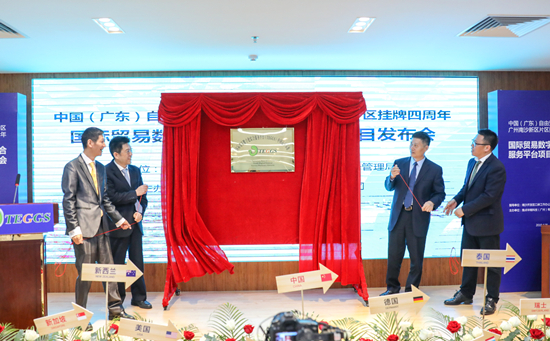Nansha opens up new era of digital trade

Guangzhou's Nansha district unveiled an integrated service platform for digital trade at a press conference on April 18.

The press conference for the International Trade Digital Integrated Service Platform is held in Nansha on April 18. [Photo by Zeng Ziyang/gznsnews.com.cn]
Nie Linhai, former inspector of the Department of Commerce and Information Technology of the Ministry of Commerce, and Pan Yuzhang, deputy director of the administrative committee of Nansha Development Zone, delivered speeches at the event.
More than 100 enterprise representatives attended the meeting.
Digital trade has injected new energy into the development of world trade and opened up new development space.
It has become an important driving force for the development of the world economy and has attracted great attention from all countries.
Since the listing of the Free Trade Zone, Nansha has focused on digital economy development, promoted the improvement of the international business environment and trade facilitation process, and launched a cross-border e-commerce supervision program with a core of regulatory intensification and customs clearance convenience.
The new digital economy format represented by cross-border e-commerce has become a banner of the reform and innovation of the Nansha Free Trade Zone.
In 2018, the total value of Nansha's cross-border e-commerce bonded import (BBC) was 9.87 billion yuan ($1.5 billion), and the inbound electronics value reached 36.6 million, which signals that Nansha has become an important hub for international cross-border e-commerce industry.
"The International Trade Digital Integrated Service Platform Project was created in response to the new trade environment. Its research and development was supported by the relevant departments of the State,”Nie Linhai said.
The Nansha Administrative Committee supports the promotion of South China Science and Technology (Guangzhou) Co to build a global customs clearance system based on cutting-edge artificial intelligence technology, electronic evidence chain technology and cross-border Internet of Things technology.
At present, the system' s technology development and online operation has been completed.
"The system has improved the efficiency of cross-border trade clearance, empowering small and medium-sized enterprises to participate in the process of international trade facilitation, and has received positive responses from international organizations such as the United Nations International Trade Center and the International Port Association," Pan Yuzhang said.
At the press conference, Zhang Weizhi, researcher of the TEGGS, demonstrated the international trade digital integrated service system.
The system provides traders with one-stop service solutions for international trade clearance and dispute resolution.
It improves the efficiency of multilateral simultaneous customs clearance and cross-border logistics, simplifies the service procedures of traditional international trade, and reduces the comprehensive service cost of importers and exporters conducting cross-border international trade.
MOST POPULAR
- 1 China to give visa-free treatment to another 9 countries
- 2 China fully opens manufacturing sector to foreign investors in landmark opening up move
- 3 China's import expo attracts record-breaking participating countries, exhibitors
- 4 China's door opening even wider to foreign visitors, businesses
- 5 China revises rules to ease foreign strategic investment in listed firms
Editors' Picks
 Video:
Peru sees new port open
Video:
Peru sees new port open
 Infographic:
China's public holidays for 2025
Infographic:
China's public holidays for 2025
 Infographic:
Basic facts of APEC
Infographic:
Basic facts of APEC
 Infographic:
Wrapping up the 7th CIIE: Data recap
Infographic:
Wrapping up the 7th CIIE: Data recap



